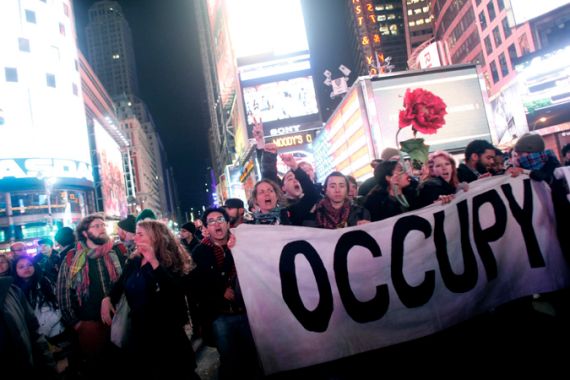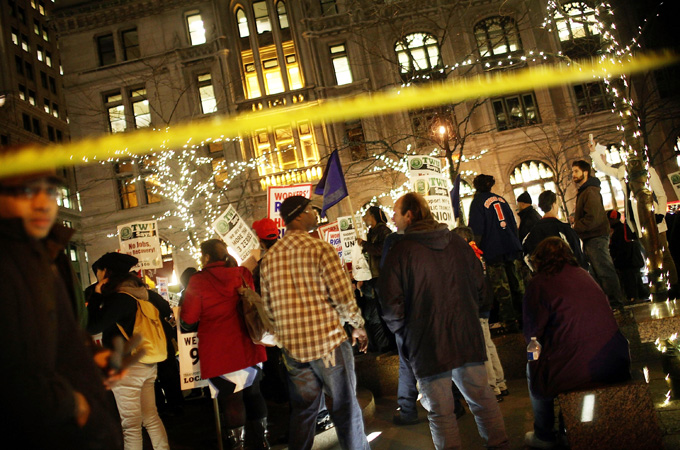Have you considered a career in total revolution?
Protesters try to create spaces for freedom and radical equality – since each individual is defined by his situation.

 |
| Each occupation is an attempt to be outside the ‘Spectacle’, even as the Spectacle ‘encircles them, flatters them and tries to assimilate what they are doing and render it safe’ [GALLO/GETTY] |
In the years after the World War II, the US and Western Europe saw unprecedented rates of sustained economic growth. Food and accommodation were cheap and working people could afford a vast range of novel commodities – electronic gadgets, cars, new styles in furniture and opportunities for leisure. Decades of war, depression and social unrest in Europe were over. Material life had never been better.
But Guy Debord and other writers and intellectuals associated with ‘Situationism’ claimed that this prosperity had been achieved at a cost that was both unacceptable and unnecessary. The technology of production had solved the problem of subsistence, but was now busy creating new, additional desires to clinch the sale of new commodities.
The choices offered by the market posed as the entire range of what could be chosen to fulfil those desires. But the sum of commodities crowded out something that couldn’t be sold. The Situationists called this crowding out the ‘Spectacle’. They wanted to find the world that the Spectacle overlaid, imitated and sold to us. There was, they said, a beach underneath the pavement.
So Situationism was an attempt to achieve revolutionary change in the midst of an economic boom. Debord and the rest didn’t want to create a political party and then capture the state. Instead, they sought to create spaces for freedom and the lived experience of radical equality: ‘since man is the product of the situations he goes through, it is essential to create human situations. Since the individual is defined by his situation, he wants the power to create situations worthy of his desires.’
It is easy to see the similarities with the current wave of occupations-and-assemblies. Each occupation is a situation where individuals learn for themselves what it is like to be outside the Spectacle, even as the Spectacle encircles them, flatters them and tries to assimilate what they are doing and render it safe. TIME magazine declares the Protester its ‘person of the year’. No doubt the editor hopes that the gesture will help to restore normality.
Situationism was always shot through with a certain romantic pessimism. Nothing that could be communicated, not even Situationism, could escape integration into the Spectacle – ‘there is no gesture so radical that it cannot be reclaimed by ideology’, said Debord.
Appropriating radicalism
And sure enough, its slogans and gestures have proved all too easy to appropriate. The assault on social democracy and the mixed economy was happy to embrace the language and imagery of radical disruption. Capitalism was for youth, diversity and rebellion and against stuffy bureaucrats, hierarchy and boring old regulations. The elements of the sixties counter-culture that couldn’t be appropriated were ignored.
The machinery of desire has made extensive use of the language and imagery of revolt in the years since 1968. This Christmas, the model in an advert for cologne announces his refusal to conform – ‘I am not going to be the person I am expected to be anymore’ – before stalking away from a press conference. The citizen of a rich country can barely get through the day without being told that this or that product will liberate them, if only they are unconventional enough to do what they are told and buy it.
But the situation of freedom, to the extent that it remained mute, remained beyond appropriation and available for radical purposes. It is being picked up again and put to new uses. The Occupations are situations in which new kinds of experience become possible.
The act of taking space creates a shared risk, a sense that each of us is consequential. The gathering of individuals who believe that what they do matters is the beginning of political power. Politics ceases to be something that one watches from a distance and becomes something that one does.
And these inheritors of the Situationists have given the old, incandescent pessimism a twist. Just as there is no gesture that cannot be appropriated by commercial culture, there is no detail of administration so banal that it cannot be made into an opportunity to drive a bankrupt and demeaning ideology towards crisis.
In Britain, UK Uncut is using the techniques of direct action and the repertoire of radical gestures to highlight the injustice and illogic at the heart of the state. Their great achievement has been to make tax planning and accountancy interesting. While advertisers insist that consumption is radical, radicalism returns to the high street in a form that is patient, polite and truly unnerving to those who remain committed to the established order of things.
‘Be Reasonable, Make Demands That Are Impossible’ is reworked as ‘Be Impossible, Make Demands That Are Reasonable’. It is a formula that for the moment eludes the operations of the Spectacle.
Daniel Hind has worked in publishing since 1998 and is the author of two acclaimed books: The Return of the Public and The Threat to Reason. He is this year’s winner of the Bristol Festival of Ideas Prize.
Follow Daniel Hind on Twitter.
The views expressed in this article are the author’s own and do not necessarily reflect Al Jazeera’s editorial policy.
